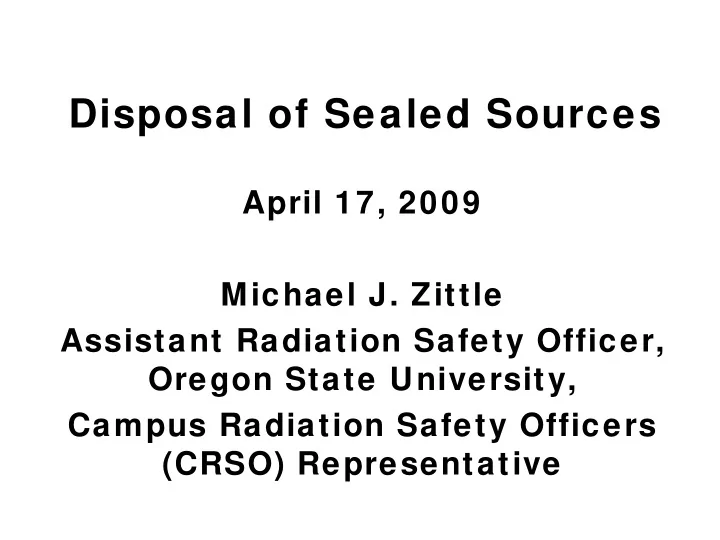

Disposal of Sealed Sources April 17, 2009 Michael J. Zittle Assistant Radiation Safety Officer, Oregon State University, Campus Radiation Safety Officers (CRSO) Representative
Sealed Source Generators • Oregon State University (OSU) • CRSO – United States and Canada • AMRSO – Private listserve spanning 4 continents • Unaffiliated Hospitals and Colleges 2
3 LLRW Disposal Sites
4 LLRW Compacts
Current Sealed Source Disposal Options 1. Class A, B, & C disposal capacity for the “Fortunate 14” • US Ecology - Richland, WA – Northw est and Rocky Mountain Compacts ONLY • Energy Solutions - Barnw ell, SC – Atlantic Compact ONLY 2. Recycle sources to vendor 3. Recycle to another licensee 4. Store sources for future disposal 5
Government Sponsored Sealed Source Disposal Options • SCATR – Source Collection and Threat Reduction Program – Funded by NNSA – Administered by CRCPD – Provides financial assistance to properly secure and dispose • Medical brachytherapy sources - 226 Ra & 137 Cs • Eye Applicators – 90 Sr • Calibration Sources – 137 Cs, 60 Co, etc. 6
Government Sponsored Sealed Source Disposal Options • OSRP – Off-Site Source Recovery Program – Funded by NNSA • Mission “to remove excess, unw anted, abandoned, or orphan radioactive sealed sources that pose a potential risk to health, safety, and national security” • Transuranics – 239 Np, 239 Pu, 241 Am, etc. • Other beta/gamma sources - 137 Cs, 60 Co 7
Generator Concerns • Lack of disposal capacity for sealed sources for 36 States • Prohibitively high disposal costs • Lack of free market competition • Onsite storage challenges – Inventory – Security – Exposure – Proper Disposal 8
SCATR Concerns • Confusion about responsibilities – States refers generators to CRCPD – CRCPD indicates that States should initiate the process • Is funding still available? • What is the status of SCATR? – State of Oregon had some movement – Inquired about designating OSU as Host Institution • Space, security, and personnel are concerns 9
SCATR Concerns • Northw est Compact – 757 sources on recovery list • Rocky Mt Compacts – 266 sources on recovery list • US Ecology operates regional disposal facility for tw o Compacts – What about thousands of “Out of Compact” sources? • CRCPD and States need to coordinate efforts for pickup and consolidation of sources 10
OSRP Concerns • Lag time after registration of sources – 1 year until acknow ledgement – 2-3 years until source collection • Clunky registration process – Excel form is difficult to w ork w ith – Erroneous confirmation inventory • OSU confirmation inventory contained (only) 5 of 29 registered sources • Unusable spreadsheet 11
Future Disposal Options • Amend the LLRWPA – To adapt to changing LLRW framew ork • Repeal the LLRWPA – To create competition and decrease cost of disposal • Utilize DOE disposal facilities for commercial generators w ho lack disposal options 12
More Future Disposal Options • Develop one or tw o disposal facilities on Federal land • Modify DOE’s disposal for GTCC w aste to include Class B and C • All options may require Congressional authorization 13
Conclusion • The cost of disposal continues to rise but most of our budgets are getting smaller • Hopefully more disposal options w ill be available to generators in the future • Let’s be Smart! – Stumbling blocks should not prevent mission • Let’s w ork together and get it done! 14
Acronyms • CRSO - Campus Radiation Safety Officers • AMRSO - Academic and Medical Radiation Safety Officers • NNSA - National Nuclear Security Administration • CRCPD - Conference of Radiation Control Program Directors • SCATR – Source Collection and Threat Reduction Program • OSRP – Off-Site Source Recovery Program • LLRWPA - Low -Level Radioactive Waste Policy Act (as amended) • GTCC - Greater-than-Class-C 15
Recommend
More recommend